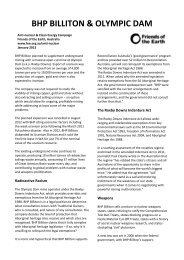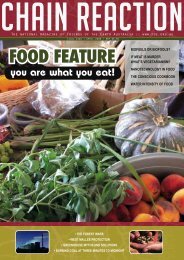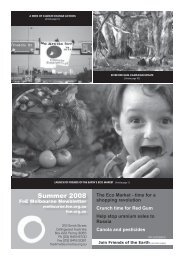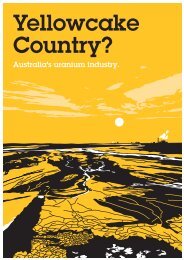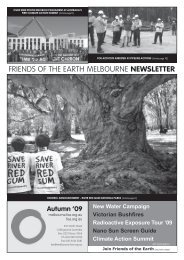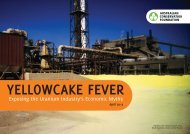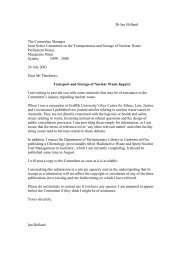Thirty Years of Creative Resistance - Friends of the Earth Australia
Thirty Years of Creative Resistance - Friends of the Earth Australia
Thirty Years of Creative Resistance - Friends of the Earth Australia
Create successful ePaper yourself
Turn your PDF publications into a flip-book with our unique Google optimized e-Paper software.
FoEA is a federation ra<strong>the</strong>r<br />
than an organisation. Some<br />
groups have always co-operated<br />
with each o<strong>the</strong>r, while some<br />
have tended to work in isolation<br />
from <strong>the</strong> rest <strong>of</strong> <strong>the</strong> network.<br />
Over <strong>the</strong> years, national<br />
meetings have agreed on shared<br />
national activities, but it was<br />
only in 1995 that FoE formalised<br />
<strong>the</strong> concept and structure <strong>of</strong> its<br />
national campaign activity.<br />
These are defined as campaign areas<br />
where two or more local groups agree<br />
to work toge<strong>the</strong>r on specified areas <strong>of</strong><br />
campaign activity, policy is developed,<br />
and <strong>the</strong> campaign proposal is approved<br />
at a national meeting. The first ‘formal’<br />
campaigns were anti-nuclear, wetlands,<br />
arid lands and transport.<br />
FoE has always placed great emphasis<br />
on its decentralised structure and <strong>the</strong>re<br />
has been an inherent bias away from<br />
any developments that could lead to<br />
a centralisation <strong>of</strong> power. Given this,<br />
<strong>the</strong>re have always been shared national<br />
activities and delegated areas <strong>of</strong><br />
responsibility within <strong>the</strong> Federation.<br />
National positions include <strong>the</strong> National<br />
Liaison (NLO) and International Liaison<br />
(ILO) <strong>of</strong>ficers (individuals nominated<br />
from within local groups who carry out<br />
specific administrative, communication,<br />
representation and campaigning work),<br />
national spokespeople and <strong>the</strong> national<br />
magazine Chain Reaction, which is an<br />
...................................................................................................................................................................................................<br />
independent service group. FoEA also<br />
runs both projects and campaigns at <strong>the</strong><br />
national level. National spokespeople have<br />
been appointed since at least 1988. The<br />
NLOs are people who are put forward by<br />
local groups. At different times, a national<br />
liaison <strong>of</strong>fice has been hosted by a local<br />
group and <strong>of</strong>fered certain support and coordination<br />
functions for <strong>the</strong> network.<br />
People filling this role have included Nick<br />
Thieberger, Lorraine Grayson, Cathy<br />
Bro<strong>the</strong>rton and Peter Bro<strong>the</strong>rton. In <strong>the</strong><br />
early 1980s, <strong>the</strong> NLO position was based<br />
in Perth but since about 1990, it has been<br />
based in Melbourne. In 1995 FoE created<br />
<strong>the</strong> regional contact position where<br />
individuals in regional centres and rural<br />
areas are able to operate under <strong>the</strong> FoE<br />
‘banner’ without <strong>the</strong> need to develop a<br />
local FoE group. This allows <strong>the</strong> network to<br />
be active in remote and rural areas where<br />
<strong>the</strong>re is a limited opportunity to establish a<br />
FoE group.<br />
The first national FoE meeting was held<br />
on French Island in Victoria’s Westernport<br />
Bay in 1974. At this time, <strong>the</strong> island was a<br />
possible site for a planned nuclear reactor.<br />
Since <strong>the</strong>n FoEA has met on an annual<br />
basis in mid January with a different local<br />
group hosting each meeting. Meetings<br />
have evolved over <strong>the</strong> years. According<br />
to Joe Wacher, a FoE staff member in<br />
<strong>the</strong> mid ‘80s, early meetings were very<br />
informal: ‘no specific policy is decided. The<br />
national meeting is mainly for an exchange<br />
<strong>of</strong> information’. Policy development and<br />
attention to national co-ordination became<br />
increasing priorities from <strong>the</strong> early 1990s.<br />
In 1995, with increased national activity<br />
and co-operation between <strong>the</strong> groups,<br />
FoE 30 <strong>Years</strong> 128



